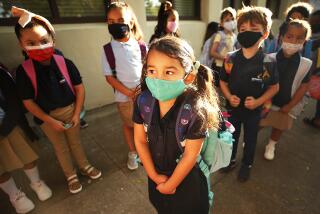WHO announces emergency committee to plan MERS virus response
- Share via
A senior World Health Organization official announced that the United Nations agency would convene an emergency committee to plan for a possible escalation in illnesses caused by the Middle East Respiratory Syndrome Coronavirus, or MERS-CoV.
Dr. Keiji Fukuda, assistant director general for health security and the environment, told reporters Friday that the names of the disease experts on the team would be revealed Monday. He characterized the move as a precautionary measure.
“We are not in the midst of any acute event right now,” he said. “But it is a good time to…do whatever we can do to be as ready as possible.”
The WHO announcement comes as scientists and public health officials continue to scratch their heads over the 79 confirmed illnesses and 42 deaths thus far caused by MERS. Researchers think MERS originates in an animal host, but they’re not sure what one. They also do not yet understand exactly how it spreads, how it infects its victims or if there are many people infected with the virus who do not get sick from it.
“Because we have gaps in that kind of information, it makes it very hard to peer into the future and make any predictions,” Fukuda said. “So...we really want to be in a position to be ready for any possibility.”
With that in mind, he added, the committee will review what’s known about the deadly virus, assess whether the outbreak constitutes a “Public Health Emergency of International Concern” — a situation that might require immediate, coordinated international action — and advise the WHO on any additional temporary recommendations that might also be needed.
The rules that govern the establishment of the group, known as the International Health Regulations, came into force in 2007 — in the aftermath of the SARS epidemic, an illness caused by another coronavirus, which sickened more than 8,400 people around the world and killed more than 800. The WHO set up its first emergency committee during 2009’s H1N1 swine flu pandemic. Friday’s announcement marks the second time such a group has been assembled.
The committee will convene by phone Tuesday. Fukuda said it was possible the team would issue recommendations quickly, but that he thought the first days would be focused mainly on understanding the outbreak more thoroughly.
During the news conference, Fukuda answered several questions from reporters concerning the upcoming Umrah and Hajj pilgrimages, which are expected to bring millions of people to Saudi Arabia -- the center of the outbreak.
Fukuda said that so far, given the relatively sporadic spread of MERS, the WHO was not recommending that Saudi Arabia or other countries “slow travel or disrupt travel right now.” But he confirmed that officials were concerned about what might happen if vast crowds move through the region. “I think it’s fair to say that a lot of our attention is really focused on the countries sending in pilgrims, and then the countries in the Middle East,” he said.
The U.S. Centers for Disease Control and Prevention activated its own committee to focus on MERS response in early June (for more on that agency’s efforts, see the related story “War on MERS,” at left.)
The WHO maintains an information page on coronaviruses, including MERS, here.







